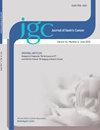Optimal Duration of Adjuvant Chemotherapy for Gastric Cancer: Might Less Be More?
IF 3.2
4区 医学
Q2 GASTROENTEROLOGY & HEPATOLOGY
引用次数: 0
Abstract
https://jgc-online.org Several large-randomized trials have indicated that adjuvant chemotherapy after curative resection with D2 lymph node dissection has a significant survival benefit in Asian patients with resectable gastric cancer. Adjuvant chemotherapy in Asian patients with resectable gastric cancer is primarily supported by the results of 2 large, randomized phase 3 trials: the Adjuvant Chemotherapy Trial of TS-1 for Gastric Cancer (ACTS-GC) and the Capecitabine and Oxaliplatin Adjuvant Study in Stomach Cancer (CLASSIC) [1,2]. Based on the results of these trials, both chemotherapy regimens (S-1 for 1 year or capecitabine plus oxaliplatin for 6 months) are currently accepted in East Asia as standard adjuvant chemotherapy regimens for pathological stage II or III gastric cancer after D2 gastrectomy [3,4]. However, as S-1 monotherapy has limited survival benefits in patients with stage III gastric cancer, oral fluoropyrimidine-based doublet regimens (capecitabine plus oxaliplatin [XELOX], S-1 plus oxaliplatin [SOX], or S-1 plus docetaxel) are recommended as adjuvant chemotherapy for these patients [2-6] (Fig. 1A).胃癌辅助化疗的最佳时间:越短越好吗?
https://jgc-online.org几项大型随机试验表明,在亚洲可切除的胃癌患者中,根治性切除并D2淋巴结清扫后的辅助化疗具有显著的生存益处。亚洲可切除胃癌患者的辅助化疗主要得到两项大型随机3期试验结果的支持:TS-1胃癌辅助化疗试验(ACTS-GC)和卡培他滨和奥沙利铂胃癌辅助研究(CLASSIC)[1,2]。根据这些试验的结果,两种化疗方案(S-1治疗1年或卡培他滨+奥沙利铂治疗6个月)目前在东亚被接受为D2胃切除术后病理II期或III期胃癌的标准辅助化疗方案[3,4]。然而,由于S-1单药治疗对III期胃癌患者的生存益处有限,建议口服氟嘧啶双药方案(卡培他滨+奥沙利铂[XELOX], S-1 +奥沙利铂[SOX],或S-1 +多西紫杉醇)作为这些患者的辅助化疗[2-6](图1A)。
本文章由计算机程序翻译,如有差异,请以英文原文为准。
求助全文
约1分钟内获得全文
求助全文
来源期刊

Journal of Gastric Cancer
Biochemistry, Genetics and Molecular Biology-Cancer Research
CiteScore
4.30
自引率
12.00%
发文量
36
期刊介绍:
The Journal of Gastric Cancer (J Gastric Cancer) is an international peer-reviewed journal. Each issue carries high quality clinical and translational researches on gastric neoplasms. Editorial Board of J Gastric Cancer publishes original articles on pathophysiology, molecular oncology, diagnosis, treatment, and prevention of gastric cancer as well as articles on dietary control and improving the quality of life for gastric cancer patients. J Gastric Cancer includes case reports, review articles, how I do it articles, editorials, and letters to the editor.
 求助内容:
求助内容: 应助结果提醒方式:
应助结果提醒方式:


